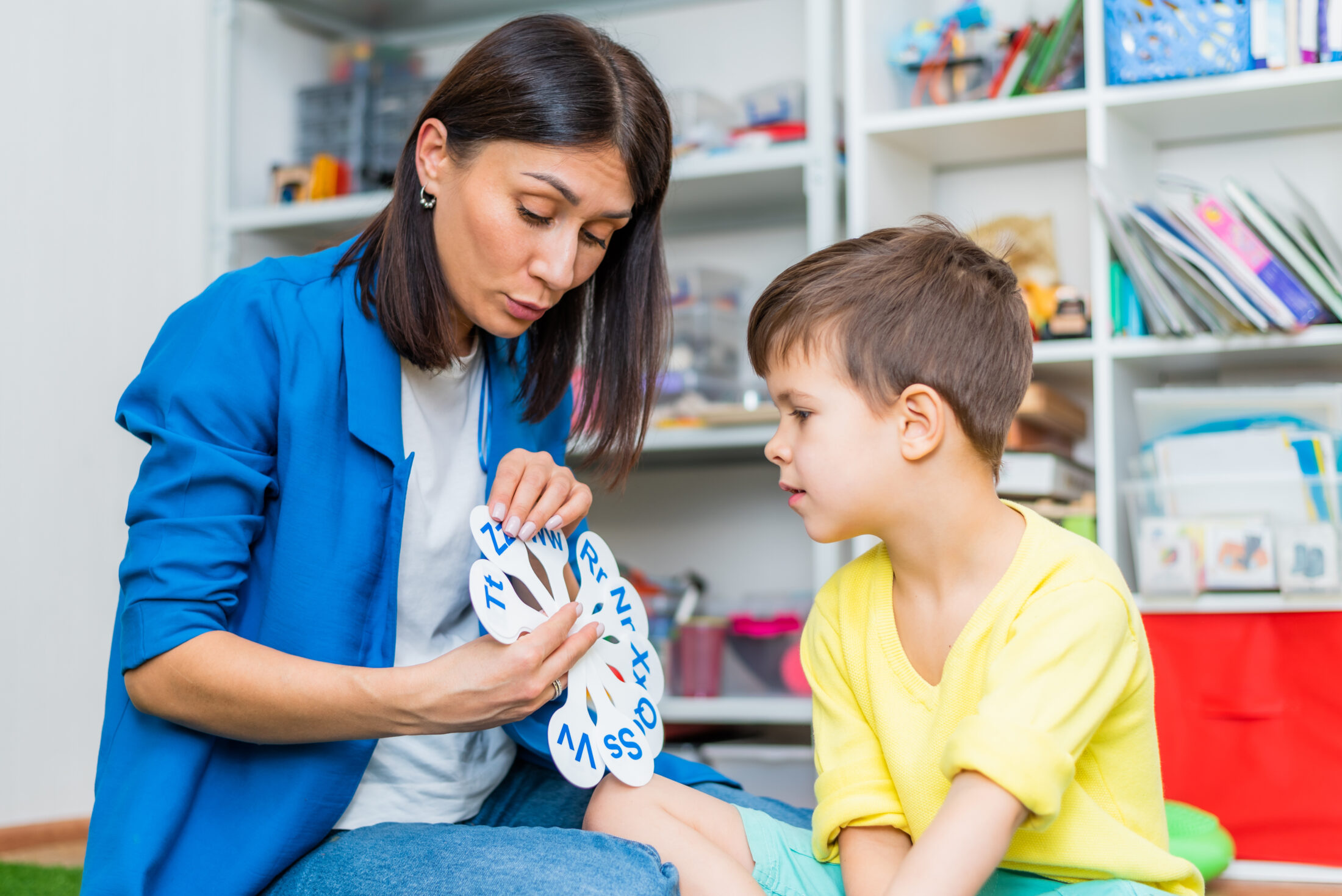Speech & Language Therapy for Kids
RISE Pediatric Therapies provides hope and help with our pediatric SLP services to children from birth through young adults. If you want to explore the possibility of receiving speech and language therapy for your child, you’ve come to the right place. We offer in-home and community early intervention services for children and families, as well as therapy clinics for developmental disabilities (TDD). We serve Mesa, Surprise, Tucson, and their surrounding areas in Arizona. Contact us at (480) 295-4925 for more information or get started now.
We Can Help With Developmental Delays
Even children of the same age have their own timetables for speech and language development. But if you’re noticing developmental gaps that are concerning, our speech-language pathologists can work with your child. We evaluate for delays in communication, language, and social skills. We then design a program to move them toward age-appropriate milestones, using routine-based, evidence-based therapy. For your convenience, we’re in-network with several insurance providers, and we also accept private pay.

Important Language & Speech Development Milestones
We can improve gaps in pediatric language development by focusing on the following skills:
Articulation
Being able to speak clearly is important for children, especially as they begin their school years. Children may incorrectly pronounce certain sounds. We’ll teach them how to use their tongue, lips, and mouth to make the correct sounds, leading to clearer speech.
Language Therapy
With a focus on receptive and expressive language skills, we’ll emphasize the following:
- constructing meaningful, easy-to-understand sentences
- following directions
- pre-writing skills
- building vocabulary
- answering questions
- comprehending stories and conversations
Voice Therapy
The incorrect use of vocal cords and breath can lead to problems with the pitch and volume of the voice. Also, too much talking, yelling, and frequent coughing all affect the quality of the voice. We teach how to correctly use vocal cords and breathing for a strong voice.
Fluency
Speech fluency is determined by the rhythm of your speech. For example, stuttering is a repetition of sounds like “b-b-b-boy.” Stuttering can also cause a person to say “um” or “uh” or pause frequently during conversation.
Augmentative & Alternative Communication
AAC teachers your child to communicate without using spoken words. Children who struggle with spoken language can still communicate using no-tech, low-tech, and high-tech alternative methods. Gesturing, drawing, and writing are no- and low-tech options. The use of a tablet or a speech-generating device are high-tech options.
The use of AAC can be an effective tool for communication development in early childhood. Our speech language pathologist can help determine an appropriate AAC method for your child to try.
Consider Hearing and Milestones Before Assuming a Speech Delay
Referring to a milestones chart can be particularly helpful for parents and caregivers as they determine if their child is on track with others their age. Please remember the following points as you use the chart:
Referring to a milestones chart can be particularly helpful for parents and caregivers as they determine if their child is on track with others their age. Please remember the following points as you use the chart:
- This chart assumes your child speaks only one language. Milestones are different for multilingual children.
- As your child nears the top of the age range, they should be close to or have achieved the milestones.
- Missing one skill in the age range does not necessarily mean your child has a speech or language delay or disorder.
Should you have any concerns about your child’s alignment with milestones, please consult your pediatrician.
Referring to a milestones chart can be particularly helpful for parents and caregivers as they determine if their child is on track with others their age. Please remember the following points as you use the chart:
- If your child does not pass the hearing screening, the hospital will refer them to a pediatric audiologist for further testing.
- If you get a referral but think your child’s hearing is normal, it’s still important to follow through with the evaluation.
- Be aware that numerous ear infections can cause hearing loss in children. Make an appointment with an audiologist to check their baseline.
RISE Pediatric Therapies is happy to give you recommendations for a local audiologist if you have questions or concerns.
Common Speech & Language Disorders
At RISE Pediatric Therapies, we offer effective, compassionate therapy for speech and language delays and disorders. Our services include the following:
- Expressive Language Disorder. Expressive disorders occur when a child struggles to share their thoughts, ideas, and feelings.
- Receptive Language Disorder. When a child has problems receiving/understanding what others say or write, it is a receptive issue. It is possible to have both receptive and expressive delays or disorders.
- Social Communication Disorder. Children who exhibit difficulties in using verbal and nonverbal language in social situations may have this disorder. They may have poor social interaction, social understanding, language processing, pragmatics, or any combination of these. These children find it difficult to make friends and have appropriate peer communication.
- Auditory Processing Disorder. Children may have problems listening and other related issues. For example, in noisy settings, children may have difficulty understanding speech and following directions. They may repeatedly ask for repetition or clarification of what was said. Academic subjects such as spelling, reading, and verbal comprehension may be difficult for them.
- Stuttering. Stuttering is an interruption in the flow of speech characterized by repetitions (sounds, syllables, words, phrases), sound prolongations, blocks, interjections, and revisions. It is important to note that stuttering is normal and developmentally appropriate in children up until the age of 6. Stuttering is more than just disfluencies. Stuttering also may include tension and negative feelings about talking. Stuttering can change from day to day. Children may have times when they are fluent and times when they stutter more. Stress or excitement can lead to more stuttering.
- Childhood Apraxia of Speech. In this disorder, a child finds it difficult to control the movement of their lips, tongue, and jaw to make the correct speech sounds. It is sometimes explained as a “brain-to-mouth” error in communication.
- Phonological Disorders. Children with this disorder find it difficult to organize sounds into words. They may leave out certain sounds from the beginning or end of a word or substitute one sound for another.
Pediatric Feeding Therapy
If your child is not meeting typical feeding milestones for their age, schedule an evaluation with our pediatric feeding specialist.
- Our specialist will assess your child’s oral structure, oral motor skills, and their ability to both eat and drink.
- Top priority is ensuring your child is safe for oral eating. We’ll evaluate feeding position, behavior, and oral movements
- If necessary and with physician clearance, our speech-language pathologists (SLP) can conduct safe oral trials with your child. We’ll develop safe alternative methods of eating and encourage a positive relationship with eating.
Start your support journey today
Our Services
Early Intervention for Birth to Age 3
- Speech & Language Therapy
- Occupational Therapy
- Physical Therapy
- Developmental Special Instruction
- Service Coordination
- Caregiver & Parent Coaching
Therapy for Developmental Disabilities (TDD)
RISE Pediatric Therapies can also assist with psychological evaluations and therapy, as well as provide social work services for families needing support or dealing with trauma or crisis. For more information, contact us.
Why Choose Us
Experienced and highly trained therapists.
Compassionate, family-oriented care and caregiver training.
Exceptional personalized programs designed by your child’s coordinated care team.
Professional systems of support for growth and achievement.
Routine-based therapy to create a fun, engaging environment where your child can learn.
Pediatric Language Development
Help your child to communicate with professional speech and language therapy from RISE Pediatric Therapies (RPT). Clear speech and comprehension will allow them to excel academically and socially. We offer in-home and community early intervention services for children and their families, as well as clinics for TDD. We serve Mesa, Surprise, Tucson, and their surrounding areas in Arizona, including Chandler, Phoenix, and Glendale. Our TDD clinics are conveniently located in Mesa and Surprise. Contact us at (480) 295-4925 for more information or get started now.
